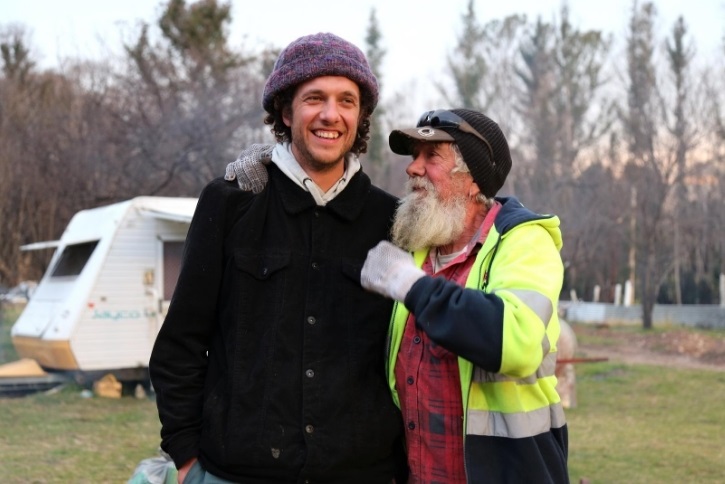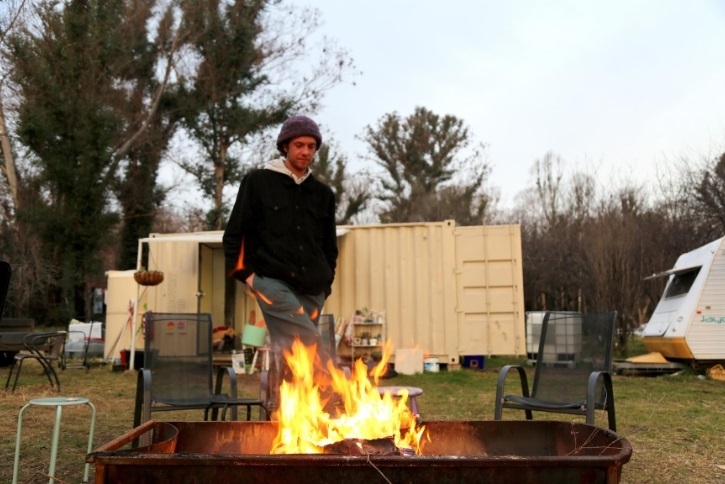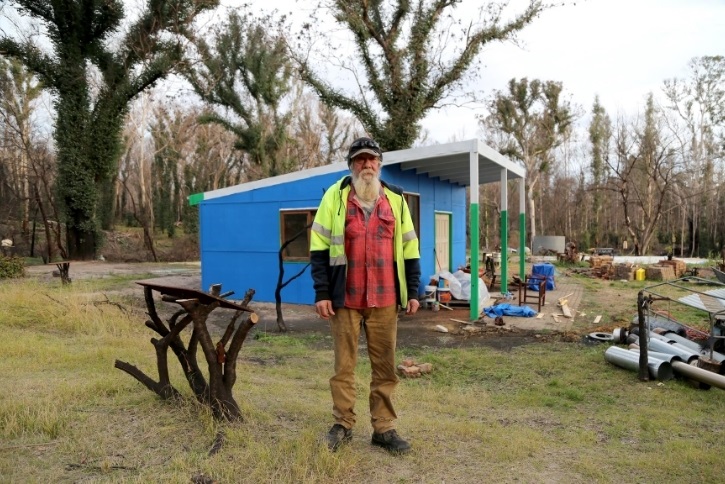Summer bushfires: every day is a new day
Jack Wotton says he is taking every day as a new day after this summer’s bushfires destroyed his family’s home near the village of Cobargo, in south-east New South Wales.

Tom and Sharyn Wotton, Jack's parents, moved to the tiny town of Wandella in the 1990s. They raised six children and built a home filled with the art and treasures they’ve collected over a lifetime. “I’m trying to imagine what that would be like to have a family, raise them in the house you’ve spent forever building, and then it’s all gone,” says Jack, their eldest son.
Red Cross has been able to give the couple grants to help rebuild their home and get back on their feet – thanks to our generous donors. “Red Cross, they kept in touch and it wasn’t just the initial money – like the initial money that was offered ended up being doubled which is amazing, who does that?”
Fleeing the fire
On December 30 last year Jack, who was staying with his parents, was out visiting his sister when he realised how serious the nearby bushfires were.
“[My sister’s] like ‘We should really think about getting mum and dad out of there.’ … I was [already] packing to go on holiday – I didn’t realise I would be packing the things in my life that would be the only things I’d end up keeping. I got out to Wandella and I started scrambling things together. My sisters, my brother and my brothers-in-law came out and we loaded as much as we could in separate cars and then got to town.”
That evening despite the worry the family tried their best to celebrate his sister’s birthday. “We were sitting around going ‘Okay, well, I’m having a little beer’ and there were these burnt gum leaves falling. The fire hadn’t hit Wandella at that point, it was on its way.
“I went to bed and I woke up about four, my brother-in-law banging on the door. It was really hot and windy. He was yelling ‘We’ve got to get out of here’. Then walking outside and my nephew handing me mum and dad’s dog, hitching the trailer with my bike on it, and we got out of there.
“We went in convoy to Bermagui. There was a lot of confusion there, it was still dark – it stayed dark all day that day.”
From there they moved on to Narooma. They still didn’t know what had happened to their family home so Jack (29) decided to go back to check. “I didn’t tell anyone, I just told my sister, I knew people would be worried … because we didn’t know what was happening with the fires, no one knew anything. There was so much misinformation.
"I got to halfway between Narooma and Cobargo and it started to look really burnt out. Then I got a glimpse of Cobargo main street – they’d blocked it off by that point – and I was like ‘Whoa, it looks like a monster’s just stepped on the middle of it.'"
“I went out to Wandella and it was black the whole way … every second house was totalled. I was still living on a prayer, thinking we would still have a house, but it was gone,” he says.
Breaking the news
Jack drove back to Narooma to break the news. “We’re a tight family, everyone was totally devastated … That was pretty sad because people broke down and were just shocked. It was a pretty hard thing to pass on.
“The first thing we did was go and get a couple of cases of overpriced beer … [they] charged us like $90 a case. Which is maybe the second most thing dad was upset about, if not the first, through the whole experience.
“It was pretty rough going. We were lucky enough to have one of my sister’s mates in town look after us. We just sat around drinking, playing music, and swapping stories,” he says.
“It was the next day that was probably the most stressful because then we had to figure out what the hell we were doing because the fires were still around. It was like okay … now we’ve got our lives to worry about.”
Surrounded by fires and with Narooma in the fire’s path, the family decided to head to Canberra. “We’ve got each other, we need to stick together, and then … we became this little herd.

“We got to Canberra and stayed with my aunty for a couple of nights, and the atmosphere there was pretty surreal too because it [the air] was super toxic … and you couldn’t get a mask to save yourself. It felt like the apocalypse."
Finding help
Eventually, when it was safe they headed back to Cobargo to regroup and there they heard for the first time about the bushfire relief centre. “People there put mum, put dad in touch with Red Cross …. They’ve been really helpful with getting our family onto things.”
Jack helped his mum fill out a Red Cross grant application. “For someone who was as stressed out as my parents there was no mystery to it, there was a simple one-pager.”
That grant was one of the first to come through and it helped his parents to feel like they weren’t alone and gave them hope. ”Once mum handed all that stuff in it was within a really short matter of time Red Cross is providing that initial relief and has continued to do so. “
His parents plan is to rebuild and in the meantime have decided to live in a campervan on their land. “A lot of people who are insured are taking rentals on the coast and they’re going to come back when it warms up and start building. What mum and dad are doing is quite a daunting task in terms of camping out there in the winter and toughing it out, it’s not something that everyone would be up for.”
Jack says his parents, who are in their 60s, have set up a kitchen in a shipping container, they have electricity but don’t yet have council water. “Their whole life is here, there’s that strong connection to that particular property. Dad was camping out there within a month … and then mum followed not long after.”

Not starting again, but moving forward
The couple, who lost almost everything they owned, are trying to stay positive, but it’s up and down, he says. “My parents they’re not money people … They had a lot of art, they collected a lot of things … you can’t replace that.
“Every day’s a new day and when mum and dad lament the loss of an item or a collection, I try to be there … 'Yeah, that’s a bummer, but it’s more time to keep this collection going. Just because you lost your collection, it doesn’t mean you aren’t still collectors.'"
He tries to help his parents see they aren’t starting again but continuing what they’ve always been doing. “’You’ve lost everything up until now but you’ll keep doing what you’re doing, and it’s only a matter of time before things start feeling like you’ve got something again.’”
Since the fires, Jack says he has found it hard talking to people who didn’t experience it firsthand. “That has been hard – entering back into the world outside of the fire. For a long time now, I feel like I could only hang out with people who have been through it. My friends are quite sympathetic … but then you hear things from people which are like, ‘Oh, that was a bit off.’”
He has found it hard too, to listen to the politicking, debates, judgements and misinformation that have followed the fires. “It’s really good to be talking about things but talk about them with an open mind. You don’t know what it’s like until you’ve lived through something like that.
“The last thing you need is division … we don’t all have to agree on things but … people need to come together and work towards something – especially in these times.”
Charity donations of $2 or more to Australian Red Cross may be tax deductible in Australia. Site protected by Google Invisible reCAPTCHA. © Australian Red Cross 2024. ABN 50 169 561 394